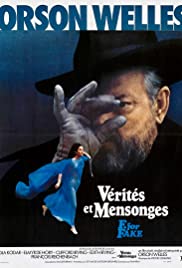
Orson Welles' final film documents the lives of infamous fakers Elmyr de Hory and Clifford Irving. De Hory, who later committed suicide to avoid more prison time, made his name by selling forged works of art by painters like Picasso and Matisse. Irving was infamous for writing a fake autobiography of Howard Hughes. Welles moves between documentary and fiction as he examines the fundamental elements of fraud and the people who commit fraud at the expense of others.
You May Also Like

In this sports documentary, Connor Stalions addresses the allegations surrounding the Michigan football sign-stealing scandal for the first time. ...

This documentary looks at the search for the remains of King Richard III of England (1452-1485). After being killed in the Battle of Bosworth Field (August 22, 1485), his ...

An intimate portrait of snooker legend Ray Reardon as he reflects on the highs and lows of a remarkable career, and relives some of his biggest sporting moments. ...

For more than 100 years, the Statue of Liberty has been a symbol of hope and refuge for generations of immigrants. In this lyrical, compelling and provocative portrait of ...

It was 1978 and the Romanian dictator Ceausescu was in control of the country. Artists were being prosecuted and isolated due to their "unacceptable" background and views ...

The cultural roots of coal continue to permeate the rituals of daily life in Appalachia even as its economic power wanes. The journey of a coal miner’s daughter ex ...